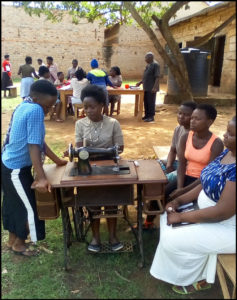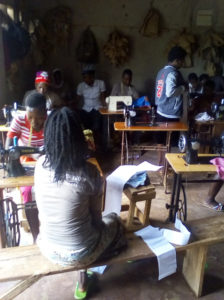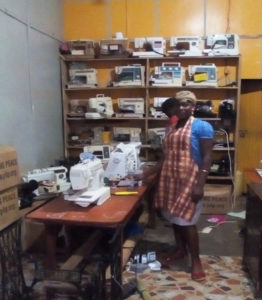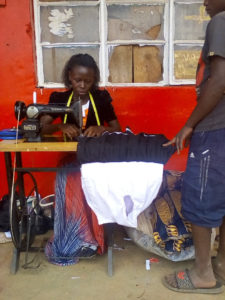By Mathew Yawe
Fall 2022 Newsletter
Mityana Open Troop Foundation is a Community-based Organization started in 1997 by a group of Boy Scouts who had been affected by socioeconomic issues leading to dropping out of school and unemployment, while others had been affected by HIV/AIDS due to loss of their relatives/guardians. The high dropout rate led to high crime rates among youths in Uganda. The initiative started by conducting training on HIV/AIDS, health talk-shows, environmental protection, child nutrition in the most risky communities, promoting food security, providing support and education to vulnerable children and conducting functional adult learning to combat illiteracy.
Vocational Training Project
Because of the above concerns, our organization started a Vocational Training project in 2007 by recruiting and training vulnerable youths, widows, and orphans in sustainable skills such as sewing and fashion design, cosmetology, hair dressing, motor mechanics, and agriculture.

However, while much of our interest was in training youths in sewing and other occupational skills, we lacked the funding to afford the tools and machines that we needed.
Our project UK partner, Mr. Chris Eldridge, found the Sewing Peace Project USA, and we wrote an application for sewing machines to Mr. David Schweidenback. Sewing Peace allocated us 72 sewing machines. This was a great miracle which we were not expecting to happen!!
At the beginning, the project had two manual sewing machines shared by 30 trainees!!

The donated refurbished sewing machines to the Mityana Open Troop Foundation were in very good condition, much better than the machines being sold in Kampala. The Sewing Peace machines were installed in our sewing workshop. Some of the machines were given out to the project graduating youths as start-up machines to enable them to start their own workshops within their communities. In Uganda, a sewing machine makes a very great difference in one’s daily income!
Donated Machines Generate Income for Our Project
 Some of the donated sewing machines are being sold in our shop at a cheaper price to some of the Ugandan schools, community based organizations, and artisans, who can’t afford buying the so-called new Chinese machines.
Some of the donated sewing machines are being sold in our shop at a cheaper price to some of the Ugandan schools, community based organizations, and artisans, who can’t afford buying the so-called new Chinese machines.
The profit from our shop is used to pay shipping costs, Ugandan custom taxes, teachers’ salaries, and electricity bills.
Achievements of the Sewing Peace Project
- As a result of the donated sewing machines since 2010, the project has received over 800 sewing machines, 451 projects graduates were provided each a start-up sewing machine.
- The Mityana Open Troop Foundation has been selling at inexpensive prices the remaining sewing machines to other Ugandan charities, schools (both secondary and primary), and individual artisans. The income from the machines we sell has enabled us to pay teachers, electricity bills, and maintenance costs.
- The project has over 40 sewing machines in the sewing workshop. This has enabled more hands-on training than when we started in 2010 with 3 machines.
- The project has become an Ugandan sewing machine importer, paying import taxes to the Government.
- The project owns a Sewing Shop in our town, equipped with an embroidery machine able to create school badges, names on uniforms, making school uniforms. The shop is selling refurbished machines to artisans, schools, and charities. These machines are much better than the Chinese machines in the market.

Our project graduates have managed supporting their families: paying for food, medication, school fees, and scholastic materials for their young brothers and sisters, and paying rent for their workshops.
The majority of our project trainees are youths who had dropped out of schools due to socioeconomic factors. Some of them were even previously selling sex on the streets at a young age for survival and without thinking of becoming pregnant or contracting STIs.
Challenges
- The project encounters challenges in raising machine shipping costs, including paying the Ugandan Custom import taxes.
- Lack of a toilet and washing rooms at our project.
- Insufficient permanent classrooms/workshops.
- Lack of clean water for trainees.
Conclusion: Many thanks to the Sewing Peace Project, USA, all volunteers involved in the collections of machines, including refurbishing activities. We also extend our sincere thanks to Mr. Chris Eldridge from the UK, who is always supportive to our project.
‘The Good You Do to Others, Comes Back To You Unknowingly.’
